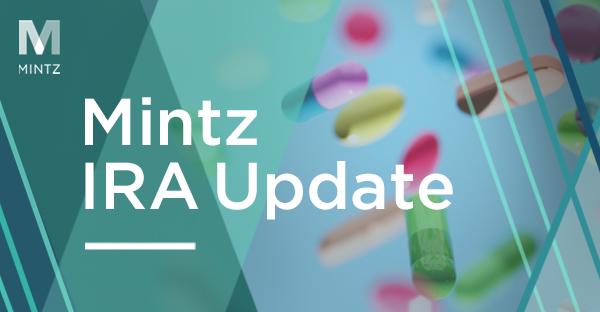
Lauren's practice focuses on advising clients through complex health care transactions and regulatory matters. She has served as health care counsel on numerous private equity and strategic transactions, including mergers and acquisitions, joint ventures, affiliations, and investments involving pharmacies, PBMs, physician practices, long-term care facilities, third party payors, value-based contracting entities, nurse staffing companies, and health care technology firms.
Lauren’s deal work is complimented by her regulatory practice, which primarily focuses on advising pharmacies, PBMs, managed care organizations and other clients in the payor space. Drawing from her experience working for the Federal Coordinated Health Care Office (the “Duals Office”) within the Centers for Medicare & Medicaid Services (“CMS”), she is able to provide practical advice to clients on regulatory and compliance issues relating to Medicare Advantage, Medicare Part D and Medicaid. She has advised clients on Medicare Advantage and Medicare Part D applications, audit appeals, contract negotiations, Medicaid managed care RFPs, and payment issues.
Lauren’s regulatory practice also focuses on compliance with the anti-kickback statute, corporate practice of medicine and fee-splitting prohibitions, telemedicine, and prescribing and licensing requirements (including change of ownership requirements).
Prior to her tenure with CMS, she was a research consultant with a health care consulting company in the DC area, working primarily with state Medicaid agencies and Medicaid managed care plans.
Experience
- Counseled private equity sponsors on health care acquisitions, including fraud and abuse issues, licensure, change of ownership, and payor matters.
- Served as health care regulatory counsel to several banks and lenders in debt financing transactions, including advising on the impact of corporate practice of medicine and other health care regulatory matters on the credit agreement and accompanying deal documents.
- Provided health care regulatory counsel to Cornell Capital in its acquisitions of truestaff and CardioSolution, as well as the acquisitions of various nurse staffing companies by Ingenovis Health.
- Advised national pharmacy chain in multiple specialty pharmacy and long-term care pharmacy acquisitions.
- Advised venture capital and private equity firms on Series C and minority investments in various health care technology firms and value-based contracting entities.
- Represented Sanford Health, a non-profit integrated health delivery system, in its affiliation with The Evangelical Lutheran Good Samaritan Society (the “Society”), a non-profit long-term care provider. Our representation primarily focused on assisting Sanford in navigating the change of ownership filings for the Society’s licenses and Medicare and Medicaid filings.
- Conducted the due diligence and provided state and federal regulatory research and analysis in connection with TPG’s acquisition of Convey Health Solutions, a specialized health care technology company that provides health plan administration, supplemental benefits administration, and consulting services to health plans.
- Advised a global health care company on a variety of issues in connection with its acquisition of several health plans and provider groups, including health care regulatory due diligence, health care regulatory advice regarding transaction structure and strategy, and preparation of regulatory notices and other filings.
- Served as regulatory counsel to a consortium of investors led by TPG Capital and Welsh, Carson, Anderson & Stowe in their $4.1 billion acquisition of Kindred Healthcare, Inc. (NYSE:KND). The transaction was recognized by The Deal as the 2018 Private Equity Deal of the Year.
- Advised a consortium of investors led by TPG Capital and Welsh, Carson, Anderson & Stowe in their $1.4 billion acquisition of Curo Health Services.
viewpoints
Mintz IRA Update — The Consequences and Costs of Redesigning the Part D Program
July 15, 2024 | Blog | By Tara E. Dwyer, Lauren Moldawer, David Gilboa, Samantha Hawkins, Stephnie John, Matthew Tikhonovsky
Read about the 2025 redesign of the Medicare Part D program pursuant to the Inflation Reduction Act of 2022 and how those changes impact Medicare Part D plan sponsors, beneficiaries, and manufacturers.
Mintz IRA Update — Third Edition: Q2 2024
July 15, 2024 | Blog | By Rachel A. Alexander, Theresa Carnegie, Madison Castle, Mitchell Clough, Tara E. Dwyer, David Gilboa, Xavier Hardy, Samantha Hawkins, Stephnie John, Bridgette Keller, Lauren Moldawer, Abdie Santiago, Hassan Shaikh
In ‘Third Edition: Q2 2024’ of the Mintz IRA Update, we cover updates to the Medicare Drug Price Negotiation Program being considered by CMS, developments in litigation challenging the program, the consequences and costs of redesigning the Part D program, opposition to the use of march-in rights to lower drug prices, and the growing use of state prescription drug affordability boards.
Unpacking CMS’s 2025 DSNP Changes: Considerations for Medicare Advantage Organizations
May 1, 2024 | Blog | By Tara E. Dwyer, Lauren Moldawer, Madison Castle
As part of its 2025 Medicare Advantage and Part D Final Rule (the Final Rule), the Centers for Medicare & Medicaid Services (CMS) made a number of enrollment changes impacting dual eligible special needs plans (DSNPs). The goal of these changes is to promote integration of Medicaid and Medicare services for full benefit dually eligible (FBDE) individuals. While stakeholders support the overall goal of better integration, the new policies are complex and may discourage Medicare Advantage Organizations (MAOs) from participating in Medicaid managed care programs in certain regions. They also highlight how a federal DSNP regulation that is tied to how a state contracts with entities that offer Medicaid benefits can result in different impacts in different states.
CMS Releases Part Two of Guidance for the Inflation Reduction Act’s Medicare Prescription Payment Plan
February 27, 2024 | Blog | By Tara E. Dwyer, Lauren Moldawer, Madison Castle
On February 15, 2024, the Centers for Medicare and Medicaid Services (CMS) released the Medicare Prescription Payment Plan Draft Part Two Guidance (Part Two Guidance) as part of the Inflation Reduction Act’s (IRA) efforts to tackle high prescription drug costs. The Medicare Prescription Payment Part Plan (the Program), which was previously referred to as the “OOP Smoothing Program”, was established as part of the IRA and requires Part D plans (PDPs) to offer their members an option to pay for out-of-pocket (OOP) prescription drug costs in monthly capped payments, as opposed to all at once, at a pharmacy. Meaning, for members who opt-in to the Program, they will pay $0 at the pharmacy and the PDP must pay the pharmacy the full cost-sharing amount of the drug and then bill the member the amount of the cost-sharing over the remainder of the calendar year.
Safeguarding Reproductive Rights
February 23, 2024 | Article
Lawyers for Good Government, in partnership with the American College of Obstetricians and Gynecologists, initiated a vital project known as The Policy Resource Hub in 2022.
Mintz IRA Update — Inaugural Edition
September 20, 2023 | Blog | By Theresa Carnegie, Tara E. Dwyer, Mitchell Clough, Xavier Hardy, Stephnie John, Bridgette Keller, Lauren Moldawer, Pat Ouellette, Hassan Shaikh
Mintz’s PBM & Pharmacy practice is proud to present the Mintz IRA Update, a regular publication that delves into the spectrum of developments under the Inflation Reduction Act of 2022 (“IRA”) impacting the health care industry.
CMS Releases Draft Part One Guidance on the Maximum Monthly Cap on Cost-Sharing Payments Program to Part D Plans
September 7, 2023 | Blog | By Tara E. Dwyer, Lauren Moldawer
Most of the recent focus around the implementation of the Inflation Reduction Act (IRA) by the press and the industry has been on the Medicare Drug Price Negotiation Program and its potential impact on manufacturers. But the Centers for Medicare & Medicaid Services (CMS) has been regularly releasing guidance regarding IRA-related changes that Part D plan sponsors had to implement for 2023 and in future years. CMS recently released guidance (Part One Guidance) on the Maximum Monthly Cap on Cost-Sharing Payments Program or the Medicare Prescription Payment Plan Program (previously referred to as the “OOP Smoothing Program”). The Medicare Prescription Payment Plan Program (the Program) will require Part D plans (PDPs) to make significant operational and system changes to meet its requirements. Many questions remain regarding the Program.
CMS Announces Drug List for Inflation Reduction Act Price Negotiations
August 29, 2023 | Alert | By Theresa Carnegie, Lauren Moldawer
The Centers for Medicare & Medicaid Services recently released the first 10 drugs included in the Inflation Reduction Act’s Medicare Drug Price Negotiation Program. Mintz Member Theresa Carnegie and Of Counsel Lauren Moldawer discuss the program, implications for drug manufacturers, and early lawsuits brought by drugmakers.
CMS Proposes New Disclosure of Ownership Regulations for Nursing Facilities - Top Five Takeaways for Private Equity Firms and REITs
February 21, 2023 | Blog | By Lauren Moldawer, Karen Lovitch
Private equity ownership of health care providers is unquestionably under scrutiny by federal and state regulators. States are passing laws that either directly or indirectly target PE health care transactions. This post highlights the top five takeaways related to the proposed regulations for private equity companies or real estate investment trust ownership.
Getting The Deal Done! Best Practices For Health Care Transactions
February 9, 2023 | Webinar
Navigating the regulatory frameworks that impact health care transactions can be challenging. These frameworks have the ability to impact multiple aspects of a transaction, including timing, structure, and valuation. Knowing how to identify and avoid these regulatory pitfalls is critical to averting these challenges that can delay or break a deal. And, ultimately, it’s what you know that can make the deal.
News & Press
Mintz has earned top rankings in the 2025 edition of Legal 500 United States and Canada guides. The firm is recognized in 20 practice categories, and 78 of its attorneys are individually ranked in the guide, with several receiving recognition in more than one category. Additionally, two attorneys are featured in the "Hall of Fame," seven attorneys are named "Leading Lawyers," and five attorneys are recognized as a "Next Generation Lawyers."
HHS Restructuring and Workforce Reductions
June 1, 2025
The Chicago Medicine Magazine recently published an article by Joanne Hawana, Lauren Moldawer, and Jeannie Mancheno, providing an overview of the Department of Health and Human Services’ restructuring and workforce reductions.
Top 10 Column - HHS Restructuring: What It May Mean for Medicare Advantage and Part D Plans and Health Care Providers
April 18, 2025
The American Bar Association published an article co-authored by Member Lauren Moldawer and Associate Jeannie Mancheno, examining how the recent restructuring and Reduction in Force (RIF) of the Department of Health and Human Services (HHS) could impact the health sector.
Member Lauren Moldawer recently connected with AIS Health about a Florida pharmacy benefit manager (PBM) law, the Prescription Drug Reform Act (PDRA). The Act aims to lower drug costs by requiring PBMs to forward all manufacturer rebates to plan sponsors and prohibiting mandatory mail-order pharmacy use for enrollees, among other reforms.
Pharmacies, PBMs at Odds over Proposed Change to Part D Contracting Rule
February 28, 2025
Member Lauren Moldawer was quoted by Healthcare Brew on how pharmacy benefit managers (PBMs) are reacting to a proposed change to the Medicare Part D Program. This change would allow pharmacies to terminate contracts without cause and without permission from the PBM, which Lauren said could create uncertainty for PBMs.
CMS Reiterates Drug Negotiation Guidance Ahead of Participation Deadline
February 27, 2025
Member Lauren Moldawer spoke with Endpoints News about how the Trump administration might approach Medicare drug price negotiations under the Inflation Reduction Act (IRA) going forward.
Mintz Advises TPG in Strategic Partnership with Surescripts
October 04, 2024
Mintz advised global alternative asset management firm TPG in a strategic partnership with Surescripts®, the nation’s leading health information network. The partnership includes an investment in Surescripts through TPG Capital, the firm’s U.S. and European private equity platform.
The Best Lawyers in America 2025 Recognizes 184 Mintz Attorneys across 56 Practice Areas
August 15, 2024
187 Mintz attorneys have been recognized by Best Lawyers® in the 2025 edition of The Best Lawyers in America©. Notably, three Mintz attorneys received 2025 “Lawyer of the Year” awards, and 64 firm attorneys were included in the 2025 edition of Best Lawyers: Ones to Watch.
Mintz Facilitates $3.7 Billion Deal For The Cigna Group
January 31, 2024
The Cigna Health Group signed a deal selling its Medicare businesses to Health Care Service Corporation (HCSC) for $3.7 billion. A Mintz team led by Tara Dwyer and Lauren Moldawer acted as regulatory counsel to The Cigna Group on the sale. In the deal, which is expected to close in the first quarter of 2025, HCSC will acquire Cigna’s Medicare lines including Medicare Advantage, Medicare supplement, and Medicare drug plans, as well as CareAllies, a unit that works with physician groups and other healthcare providers.
Mintz Announces Record Member Growth in 2023
December 22, 2023
Mintz proudly announced the election of 13 attorneys to Members and the addition of a record-setting 22 new lateral Members in 2023, with 11 Partners in the newly opened Toronto office. This diverse group strengthens Mintz’s core areas, spanning Commercial and IP Litigation, Life Sciences, Tech, Private Equity, and Energy & Sustainability. The elevated Members and new lateral additions bring invaluable expertise to help clients navigate complex legal landscapes.
4 Pharma Industry Arguments Against CMS Drug Pricing Plan
September 29, 2023
Theresa Carnegie, Lauren Moldawer, and Hassan Shaikh co-authored an article published by Law360 on the Inflation Reduction Act's Medicare drug pricing negotiation program.
Mintz is pleased to announce that 120 firm attorneys have been recognized as leaders by Best Lawyers® in the 2024 edition of The Best Lawyers in America©.
Mintz Advises Kindred at Home in $5.7 Billion Sale to Humana
August 23, 2021
podcasts
Health Law Diagnosed — Mintz Health Law Team: Reflecting on What We Are Grateful For
February 5, 2024 | Podcast | By Bridgette Keller
As the Mintz Health Law team welcomes the beginning of 2024, many of its members take a moment to reflect on the exciting growth of the Health Law Practice, opportunities to partner with clients on complex legal issues, and the celebration of numerous milestones.
Health Law Diagnosed: Transactions Part 2: Health Regulatory Diligence and How to Prepare for a Sell-Side Transaction
March 24, 2022 | Podcast | By Tara E. Dwyer, Xavier Hardy, Bridgette Keller, Lauren Moldawer, Cassandra Paolillo, Kate Stewart
Health regulatory diligence has the ability to make or break a deal. Listen to hear about our team’s firsthand experience in the importance of conducting health regulatory diligence and best practices in preparing for a sell-side transaction.
Health Law Diagnosed — Transactions Part 1: Regulatory Trends in Recent Health Care Transactions
March 3, 2022 | Podcast | By Xavier Hardy, Bridgette Keller, Lauren Moldawer, Cassandra Paolillo, Kate Stewart
Events & Speaking
Legal, Regulatory and Contractual Issues When Structuring Value-Based Agreements
14th Association for Value-Based Cancer Care Summit
New York, NY

Recognition & Awards
Best Lawyers in America: Ones to Watch - Health Care Law (2024, 2025)
Recognized by The Legal 500 United States for Healthcare: Service Providers (2025)







